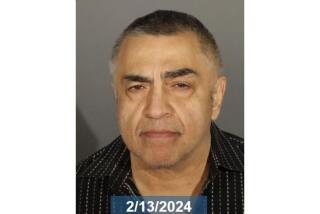Drug Indictments Show Intricate International Links
Roberto Baez-Alcaino’s neighbors thought there might be something strange going on at 1810 Putney St. in the normally sedate Linda Vista area near the Rose Bowl.
Their suspicions may have been confirmed this month as Alcaino was named in federal indictments as a cocaine trafficker and key figure in a massive money-laundering scheme involving the seventh-largest private bank in the world.
Alcaino, a 51-year-old jeweler, was arrested last month in New York after allegedly supervising the unloading of a truck containing 17 pounds of cocaine. The cocaine was part of a 2,478-pound shipment that had entered the country through the Port of Philadelphia concealed in cans of anchovies. It was the largest seizure in the city’s history.
Federal Indictments
The plot grew thicker Tuesday when federal indictments were unsealed in Tampa, Fla., which accused Alcaino of heading a drug ring--affiliated with the infamous cartel based in Medellin, Colombia--that imported cocaine into California, New York and Europe. Alcaino was among 84 alleged drug smugglers and money launderers indicted, of whom 40 have been arrested.
They include nine officers of the Luxembourg-based Bank of Credit and Commerce International, who were charged Tuesday with laundering more than $14.3 million in cocaine profits through an elaborate system of money transfers between branches on three continents. A total of $32.7 million was laundered during the two-year investigation conducted by the U.S. Customs Service.
On Tuesday, officials seized Alcaino’s Linda Vista home and furnishings worth more than $2 million; the $400,000 inventory of Alcaino’s store, Tiffari Jewelers in Los Angeles; two Rolls-Royce and two Mercedes-Benz cars, and a $1-million apartment building under construction in Los Angeles.
Alcaino is being held without bail in New York, where he faces federal charges involving money laundering, conspiracy, and the importation and possession of cocaine. His wife, Gloria, was arrested in Los Angeles on charges of conspiracy and money laundering.
Neighbors said the reclusive Alcainos, who they said had lived in Pasadena for several years, had visitors at all hours, kept two guard dogs and built a high fence with security cameras around the home.
“One does wonder why in conservative old Pasadena one needs guard dogs and high fences,” said Cynthia Poindexter, who lives one street away from the Alcaino residence. “Those dogs are pretty scary when they’re let loose.”
Another neighbor, who asked not to be identified, said: “We used to say laughingly that our neighbors were dope dealers. It was shocking when we found out it was true.”
Neighbor Ray Hyde expressed relief at the news of Alcaino’s arrest.
“I’m glad to see anybody in that business, especially a major dealer, off the streets,” he said.
Attorney Harold Greenberg, who has represented the Alcainos for the 10 years, said Wednesday that the couple are Chileans who came to this country 25 years ago. Greenberg said he was not aware of any previous drug convictions against them.
As for the allegations made by federal officials, Greenberg said he does not believe Gloria Alcaino was knowingly involved in drug trafficking or money laundering.
‘Unwitting Dupe’
Greenberg said he thinks federal prosecutors “are going to have some problems. She’s not a very sophisticated person. You have a traditional Latino relationship where the wife does not know business. . . . I think they’re going to find she was an unwitting dupe.”
By contrast, Greenberg described Alcaino as a chic, urbane businessman. “He knows his way around,” the attorney said. “He dresses impeccably. His manners are great. In other words, he has some culture.”
While he intends to argue that Gloria Alcaino was an unwitting accomplice, Greenberg said he is unsure what strategy he will use to defend her husband.
“I’ll have to wait and see what the government has,” he said.
The federal investigation, code-named C-Chase, began in July, 1986, when an undercover agent from the Customs Service became involved in the money-laundering operation of the Gonzalo Mora organization.
At that time, the organization was laundering drug profits by converting the funds into cashier’s and bank checks and then smuggling them out of the country, said Edgar Adamson, the Customs Service’s special agent in charge in Los Angeles.
Most of the money was funneled through a Bank of Credit branch in Panama to Colombia, the Customs Service said.
In December, 1987, the undercover agents were approached by officials from the Bank of Credit who offered to provide a more sophisticated method of smuggling drug profits out of the country, Adamson said.
The bank, which has branches in 72 countries and nine U.S. cities, proposed setting up several secret accounts to handle the flow of money from the Mora organization.
Drug profits would be picked up by messengers, wired to a secret account in Tampa and then transferred to overseas accounts, Adamson said.
A drug operation headed by Alcaino heard about the money-laundering operation and asked if it could contract for the same services, Adamson said.
The undercover operation was forced to end when Alcaino was arrested in New York, he said.
“We hadn’t planned it. It sort of hastened our investigation,” Adamson said. “We would have eventually ended the investigation, but maybe not in October.”
To get as many of the suspects together at one time, the agents invited the main dealers to a phony marriage in Tampa on Oct. 8, Adamson said. Nine suspects were arrested at the wedding.
In Los Angeles, agents arrested Gloria Alcaino and Ashraf Iqbal Syed, 28, Los Angeles branch manager for the Bank of Credit.
Nationwide, the Customs Service has seized $4.5 million in cash, $3.2 million in real estate and $19.3 million in bank certificates of deposit.
More to Read
Sign up for Essential California
The most important California stories and recommendations in your inbox every morning.
You may occasionally receive promotional content from the Los Angeles Times.










